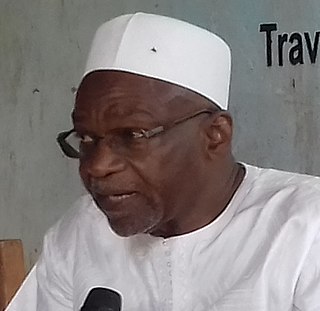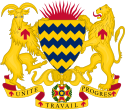
Idriss Déby Itno was a Chadian politician and military officer who was the 6th president of Chad from 1991 until his death in 2021 during the Northern Chad offensive. His term of office of more than 30 years makes him Chad's longest-serving president.

The Patriotic Salvation Movement is the ruling political party in Chad.
The Union for Renewal and Democracy is a political party in Chad. Its current president is Sande Ngaryimbé, its first being Wadel Abdelkader Kamougué.

Saleh Kebzabo is a Chadian politician. He is the President of the National Union for Democracy and Renewal (UNDR) and a Deputy in the National Assembly of Chad. He was designated Prime Minister by president Mahamat Déby on 12 October 2022.
Nouradine Delwa Kassiré Koumakoye is a Chadian politician and the head of the National Rally for Development and Progress (VIVA-RNDP) political party. After serving as a minister in the government during the 1980s and early 1990s; he was Prime Minister of Chad from November 6, 1993 to April 8, 1995 and again from February 26, 2007 to April 16, 2008. In 2008, he became President of the Economic, Social and Cultural Council.
Wadel Abdelkader Kamougué was a Chadian politician and army officer. Kamougué was a leading figure in the 1975 coup d'état and subsequently held several positions in the Chadian government and legislature. He was Vice President of Chad from 1979 to 1982 and President of the National Assembly from 1997 to 2002. Kamougué was also President of the Union for Renewal and Democracy (URD) political party, and he was appointed as Minister of National Defense in April 2008.
Jean Alingué Bawoyeu, known in French as the vieux sage, which translates as "wise elder", is a Chadian politician who was Prime Minister of Chad from 1991 to 1992. During the 1970s, he served successively as Ambassador to the United States and France. Later, he was President of the National Assembly in 1990. He served in the government as Minister of Justice from 2008 to 2010 and as Minister of Posts and New Information Technologies from 2010 to 2013.
Lol Mahamat Choua was a Chadian politician who served as his country's head of state for four months in 1979. He was the President of the Rally for Democracy and Progress (RDP) political party.

Presidential elections were held in Chad on 3 May 2006. A referendum in 2005 had led to changes to the constitution that made it possible for President Idriss Déby to run for a third term; having come to power in December 1990, he had previously won elections in 1996 and 2001. Despite a serious rebellion based in the east of the country, the elections were held on schedule; Déby was re-elected with about 65% of the vote, according to official results. The main opposition parties boycotted the election.

Ngarlejy Koji Yorongar le Moinban is a Chadian politician. He is the Executive Federal Coordinator of the Federation, Action for the Republic, a radical opposition party, as well as a Deputy in the National Assembly of Chad and President of the Federation Parliamentary Group.
Ibni Oumar Mahamat Saleh is a Chadian politician and opposition leader who headed the Party for Liberties and Development (PLD).

Albert Pahimi Padacké is a Chadian politician who was Prime Minister of Chad from 26 April 2021 to 12 October 2022. He was also Prime Minister from 2016 to 2018, when he resigned and was not replaced.

Parliamentary elections were held in Chad on 13 February 2011, the first such elections since 2002. They were originallu scheduled for 28 November 2010, but were postponed in September that year. The National Independent Electoral Commission attributed the two-month delay to complications encountered during the preparation process.

The Constitution of the Republic of Chad is the supreme law of Chad. Chad's seventh constitution, it was adopted in 1996, six years after President Idriss Déby rose to power following a successful rebellion against President Hissène Habré, this formal document establishes the framework of the Chadian state and government and enumerates the rights and freedoms of its citizens. In its current form, the contents of the Constitution include a preamble, 16 parts and 225 articles.

Presidential elections were held in Chad on 10 April 2016. Incumbent President Idriss Déby was re-elected for a fifth term.

Parliamentary elections were held in Chad on 29 December 2024, along with elections for regional and local offices. These are the first legislative elections to be held in Chad since 2011, and the first since the death of long-time ruler Idriss Déby in 2021, and the accession to leadership of his son, Mahamat Déby, first as leader of a military junta then as president in his own right, laying the groundwork for a hereditary dictatorship.

Presidential elections were held in Chad on 11 April 2021. Incumbent Idriss Déby, who served five consecutive terms since seizing power in the 1990 coup d'état, was running for a sixth. Déby was described as an authoritarian by several international media sources, and as "strongly entrenched". During previous elections, he forbade the citizens of Chad from making posts online, and while Chad's total ban on social media use was lifted in 2019, restrictions continue to exist.

Presidential elections were held in Chad on 6 May 2024. The elections followed a constitutional referendum held on 17 December 2023, following the death of President Idriss Déby in 2021. Incumbent transitional president Mahamat Déby, the son of Idriss Déby, ran as the candidate of the Patriotic Salvation Movement, winning the election and leading to another extension of 34 years of rule by the Déby family.

A constitutional referendum in Chad was held on 17 December 2023 on a new constitution formulated following the death of President Idriss Déby in 2021. The draft had been approved by the National Transitional Council on 27 June 2023. Provisional results were announced on 24 December 2023, and they were validated by the Supreme Court of Chad on 28 December 2023.

Succès Masra is a Chadian economist and politician who served as the Prime Minister of Chad from 1 January to 22 May 2024. Having formerly worked for the African Development Bank, in 2018 he founded Les Transformateurs, a political party that became part of the opposition against former president Idriss Déby, and following Déby's death in 2021, the Transitional Military Council.







